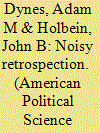| Srl | Item |
| 1 |
ID:
154903


|
|
|
|
|
| Summary/Abstract |
Recent child development research shows that the psychosocial or noncognitive skills that children develop—including the ability to self-regulate and integrate in social settings—are important for success in school and beyond. Are these skills learned in childhood also important for adult political behaviors like voting? In this article, I use a unique school-based 20-year field experiment to explore whether children who develop psychosocial skills early on are more likely to vote in adulthood than those who do not. Matching subjects to voter files, I show that this intervention had a noticeable long-run impact on political participation. These results highlight the need to better understand how childhood experiences shape civic behaviors later in life. During this critical period, children can be taught the not explicitly political, but still vital, skills that set them on a path toward political participation in adulthood.
|
|
|
|
|
|
|
|
|
|
|
|
|
|
|
|
| 2 |
ID:
171345


|
|
|
|
|
| Summary/Abstract |
Retrospective voting is vital for democracy. But, are the objective performance metrics widely thought to be relevant for retrospection—such as the performance of the economy, criminal justice system, and schools, to name a few—valid criteria for evaluating government performance? That is, do political coalitions actually have the power to influence the performance metrics used for retrospection on the timeline introduced by elections? Using difference-in-difference and regression discontinuity techniques, we find that US states governed by Democrats and those by Republicans perform equally well on economic, education, crime, family, social, environmental, and health outcomes on the timeline introduced by elections (2–4 years downstream). Our results suggest that voters may struggle to truly hold government coalitions accountable, as objective performance metrics appear to be largely out of the immediate control of political coalitions.
|
|
|
|
|
|
|
|
|
|
|
|
|
|
|
|